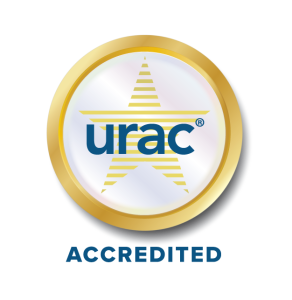THIS NOTICE DESCRIBES HOW MEDICAL INFORMATION ABOUT YOU MAY BE USED AND DISCLOSED AND HOW YOU CAN GET ACCESS TO THIS INFORMATION.
PLEASE REVIEW IT CAREFULLY.
This HIPAA Notice of Privacy Practices (Notice) contains important information regarding your medical information. Our current Notice is posted at https://www.coordinatingcenter.org/. You also have the right to receive a paper copy of this Notice and may ask us to give you a copy of this Notice at any time. If you received this Notice electronically, you are entitled to a paper copy of this Notice. If you have any questions about this Notice, please contact the person listed below in Part 8.
The Health Insurance Portability and Accountability Act of 1996 (HIPAA) imposes numerous requirements on certain health care providers regarding how certain individually identifiable health information – known as protected health information or PHI – may be used and disclosed. This Notice describes how The Coordinating Center (The Center), and any third party that assists in the administration of The Center, may use and disclose your protected health information for treatment, payment or health care operations and for other purposes that are permitted or required by law. This Notice also describes your rights to access and control your protected health information. “Protected health information” is information that is maintained or transmitted by The Center, which may identify you and that relates to your past, present or future physical or mental health or condition and related health care services.
We understand that medical information about you and your health is personal. We are committed to protecting medical information about you. This Notice applies to all of the medical records we maintain.
We are required by law to abide by the terms of this Notice to:
- Make sure that medical information that identifies you is kept private.
- Give you notice of our legal duties and privacy practices with respect to medical information about you.
- Follow the terms of the Notice that is currently in effect.
- How We May Use and Disclose Medical Information About You.
HIPAA generally permits use and disclosure of your health information without your permission for purposes of health care treatment, payment activities and health care operations. These uses and disclosures, and others, are more fully described below. Please note that this Notice does not list every use or disclosure, instead it gives examples of the most common uses and disclosures.
- Treatment: We may use or disclose medical information about you to provide and facilitate medical treatment or services. We may disclose medical information about you to health care providers, including doctors, nurses, technicians, and medical students who are involved in taking care of you. For example, we might disclose information about you with physicians who are treating you.
- Payment: When and as appropriate, we may use and disclose medical information about you to determine your eligibility for benefits, to facilitate payment for the treatment and services you receive from us, to determine benefit responsibility and coverage, or to coordinate your coverage. For example, we may disclose information about your medical history to your health insurance company or third party. Additionally, we may share medical information with another entity to assist us in collecting payments due for services provided.
- Health Care Operations: When and as appropriate, we may use and disclose medical information about you for The Center operations, as needed. For example, we may use medical information in connection with: conducting quality assessment and clinical improvement; conducting or arranging for medical review, legal services, audit services and fraud and abuse detection programs; business planning and development such as cost management; and business management and general administrative activities of The Center. For example, we may use your information to review the effectiveness of programs.
- Health Information Exchange: We may share information that we obtain or create about you with other health care providers or health care entities through the Chesapeake Regional Information System for our Patients, Inc. (CRISP), a regional health information exchange serving Maryland and D.C. As permitted by law, your health information will be shared with this exchange in order to provide faster access, better coordination of care, and assist providers and public health officials in making more informed decisions. You may “opt out” and disable all access to your health information available through CRISP by calling 1-877-952-7477 or completing and submitting an Opt-Out form to CRISP by mail, fax or through their website at www.crisphealth.org. Public Health reporting and Controlled Dangerous Substances information as part of the Maryland Prescription Drug Monitoring Program (PDMP), will still be available to providers, even if you opt-out.
- Fundraising Activities: we may use or disclose medical information about you to contact you about our fundraising activities to benefit The Center. Information we may use includes demographic information (for example, your name, address, contact information, age, gender, and birthdate), when your received services, which program or department you received services under, who provided your services, and your services outcome. You may “opt out” of receiving fundraising communications by following the instructions to opt out (or be removed from a mailing list) which are included in all fundraising communications involving The Center.
We will always try to ensure that the medical information used or disclosed will be limited to a “Designated Record Set” and to the “Minimum Necessary” standard, including a “limited data set,” as defined in HIPAA. We may also contact you to provide information about treatment options or alternatives or other health-related benefits and services that may be of interest to you.
OTHER PERMITTED USES AND DISCLOSURES
- Disclosure to Others Involved in Your Care: We may disclose medical information about you to a relative, a friend or to any other person you identify, provided the information is directly relevant to that person’s involvement with your health care or payment for that care. For example, if a family member or a caregiver calls us with prior knowledge of a claim and asks us to help verify the status of a claim, we may agree to help them confirm whether or not the claim has been received and paid.
- Workers’ Compensation: We may release medical information about you for workers’ compensation or similar programs. These programs provide benefits for work related injuries or illness.
- To Comply with Federal and State Requirements: We will disclose medical information about you when required to do so by federal, state or local law. For example, we may disclose medical information when required by the U.S. Department of Labor or other government agencies that regulate us; to federal, state and local law enforcement officials; in response to a judicial order, subpoena or other lawful process; and to address matters of public interest as required or permitted by law (for example, reporting child abuse and neglect, threats to public health and safety and for national security reasons). We are required to disclose medical information about you to the Secretary of the U.S. Department of Health and Human Services if the Secretary is investigating or determining compliance with HIPAA or to authorized federal officials for intelligence, counterintelligence and other national security activities authorized by law. We may disclose your medical information to a health oversight agency for activities authorized by law (such as audits, investigations, inspections and licensure).
- To Avert a Serious Threat to Health or Safety: We may use and disclose medical information about you when necessary to prevent a serious threat to your health and safety or the health and safety of the public or another person. Any disclosure, however, would only be to someone able to help prevent the threat. For example, we may disclose medical information about you in a proceeding regarding the licensure of a physician.
- Military and Veterans: If you are a member of the armed forces, we may release medical information about you as required by military command authorities. We may also release medical information about foreign military personnel to the appropriate foreign military authority.
- Business Associates: We may disclose your medical information to our business associates. We have contracted with entities (defined as “business associates” under HIPAA) to help us in our operations. We will enter into contracts with these entities requiring them to only use and disclose your health information as we are permitted to do so under HIPAA.
- Other Uses: If you are an organ donor, we may release your medical information to organizations that handle organ procurement or organ, eye or tissue transplantation or to an organ donation bank, as necessary to facilitate organ or tissue donation and transplantation. We may release your medical information to a coroner or medical examiner. If you are an inmate of a correctional institution or under the custody of a law enforcement official, we may release your information to the correctional institution or law enforcement official.
Uses and disclosures other than those described in this Notice will require your written authorization.
Your written authorization is required for:
- most uses and disclosures of psychotherapy notes;
- uses and disclosures of PHI for marketing purposes; and
- disclosures that are a sale of PHI.
You may revoke your authorization at any time, but you cannot revoke your authorization if The Center has already acted on it.
The privacy laws of a particular state or other federal laws might impose a stricter privacy standard. If these stricter laws apply and are not superseded by federal preemption rules, The Center will comply with the stricter law.
- Your Rights Regarding Medical Information About You.
You have the following rights regarding medical information we maintain about you:
Your Right to Inspect and Copy: You have the right to inspect and obtain a copy of your medical information in a designated record set, as long as that information is maintained in the designated record set.
- If you request a copy of the information, we may charge a fee for the costs of copying, mailing or other supplies associated with your request.
- We may deny your request to inspect and copy in certain very limited circumstances. If you are denied access to medical information, you may request that the denial be reviewed. If The Center does not maintain the health information, but know where it is maintained, you will be informed of where to direct your request.
Your Right to Amend: If you feel that medical information we have about you is incorrect or
incomplete, you may ask us to amend the information. You have the right to request an amendment for as long as the information is kept by or for The Center.
In addition, you must provide a reason that supports your request.
We may deny your request for an amendment if it is not in writing or does not include a reason to support the request. In addition, we may deny your request if you ask us to amend any of the following information:
- Information that is not part of the medical information kept by or for The Center.
- Information that was not created by us, unless the person or entity that created the information is no longer available to make the amendment.
- Information that is not part of the information which you would be permitted to inspect and copy.
- Information that is accurate and complete.
Your Right to an Accounting of Disclosures: You have the right to request an “accounting of disclosures” (that is, a list of certain disclosures The Center has made of your health information). Generally, you may receive an accounting of disclosures if the disclosure is required by law, made in connection with public health activities, or in similar situations as those listed above as “Other permitted uses and disclosures”. You do not have a right to an accounting of disclosures where such disclosure was made:
- For treatment, payment, or health care operations.
- To you about your own health information.
- Incidental to other permitted disclosures.
- Where authorization was provided.
- To family or friends involved in your care (where disclosure is permitted without authorization).
- For national security or intelligence purposes or to correctional institutions or law enforcement officials in certain circumstances.
- As part of a limited data set where the information disclosed excludes identifying information.
To request this list or accounting of disclosures, you must submit your request, which shall state a time period, which may not be longer than six years and may not include dates before April 14, 2003. Your request should indicate in what form you want the list (for example, paper or electronic). The first list you request within a 12-month period will be free. For additional lists, we may charge you for the costs of providing the list. We will notify you of the cost involved and you may choose to withdraw or modify your request at that time before any costs are incurred.
Notwithstanding the foregoing, you may request an accounting of disclosures of any “electronic health record” (that is, an electronic record of health-related information about you that is created, gathered, managed and consulted by authorized health care clinicians and staff), provided that you must submit your request and state a time period which may be no longer than three years prior to the date on which the accounting is requested. In the case of any electronic heath record created on your behalf on or before January 1, 2009, this paragraph shall apply to disclosures made on or after January 1, 2014. In the case of any electronic health record created on your behalf after January 1, 2009, this paragraph shall apply to disclosures made on or after the later of January 1, 2011 or the date we acquired the electronic health record.
Your Right to Request Restrictions: You have the right to request a restriction or limitation on the medical information we use or disclose about you for treatment, payment or health care operations. You also have the right to request a limit on the medical information we disclose about you to someone who is involved in your care or the payment for your care, like a family member or friend. For example, you could ask that we not use or disclose information about a surgery that you had.
We are not required to agree to your request. If The Center does agree to a request, a restriction may later be terminated by your written request, by agreement between you and The Center (including orally), or unilaterally by The Center for health information created or received after The Center has notified you that they have removed the restrictions and for emergency treatment.
To request restrictions, you must make your request in writing and must tell us the following information:
- What information you want to limit.
- Whether you want to limit our use, disclosure or both.
- To whom you want the limits to apply (for example, disclosures to your spouse).
Effective February 17, 2010 (or such other date specified as the effective date under applicable law) we will comply with any restriction request if: (1) except as otherwise required by law, the disclosure is to The Center for purposes of carrying out payment or health care operations (and is not for purposes of carrying out treatment); and (2) the protected health information pertains solely to a health care item or service for which the health care provider involved has been paid out-of-pocket in full.
Your Right to Request Confidential Communications: You have the right to request that we communicate with you about medical matters in a certain way or at a certain location. For example, you can ask that we only contact you at work or by mail. We will not ask you the reason for your request. We will accommodate all reasonable requests. Your request must specify how or where you wish to be contacted, and we ask that your request be made in writing.
You must make any of the requests described above, to the person listed in Part 8, below.
- Breach Notification.
We understand that medical information about you and your health is personal and we are committed to protecting your medical information. Furthermore, we will notify you following the discovery of any “breach” of your unsecured protected health information as defined in the HITECH Act (the “Notice of Breach”). Your Notice of Breach will be in writing and provided via first-class mail, or alternatively, by e-mail if you have previously agreed to receive such notices electronically. If the breach involves:
- 10 or more individuals for whom we have insufficient or out-of-date contact information, then we will provide substitute individual Notice of Breach by either posting the notice on the web site of The Center or by providing the notice in major print or broadcast media where the affected individuals likely reside.
- Less than 10 individuals for whom we have insufficient or out-of-date contact information, then we will provide substitute Notice of Breach by an alternative form.
Your Notice of Breach shall be provided without unreasonable delay and in no case later than 60 days following the discovery of a breach and shall include, to the extent possible:
- A description of the breach.
- A description of the types of information that were involved in the breach.
- The steps you should take to protect yourself from potential harm.
- A brief description of what we are doing to investigate the breach, mitigate the harm, and prevent further breaches.
- The Center’s relevant contact information.
Additionally, for any substitute Notice of Breach provided via web posting or major print or broadcast media, the Notice of Breach shall include a toll-free number for you to contact us to determine if your protected health information was involved in the breach.
- Changes to This Notice.
We can change the terms of this Notice at any time. If we do, the new terms and policies will be effective for all of the medical information we already have about you as well as any information we receive in the future. We will post any revised notice on the web address listed on page 1 of this Notice, and you may request a copy of the revised notice.
- Complaints.
If you believe your privacy rights have been violated, you may file a complaint with The Center or with the Secretary of the Department of Health and Human Services. To file a complaint with The Center, contact the person listed below in Part 8.
All complaints must be submitted in writing. You will not be penalized for filing a complaint.
- Other Uses of Medical Information.
Other uses and disclosures of medical information not covered by this Notice or the laws that apply to us will be made only with your written permission. If you grant us permission to use or disclose medical information about you, you may revoke that permission, in writing, at any time. If you revoke your permission, we will no longer use or disclose medical information about you for the reasons covered by your written authorization. We are unable to take back any disclosures we have already made with your permission.
- Effective Date.
The effective date of this Notice is August 1, 2016.
- Contact Information.
All correspondences relating to the contents of this Notice should be directed as follows:
The Coordinating Center
Privacy Officer
8531 Veterans Highway, 3rd Floor
Millersville, Maryland 21108
(410) 987-1048
privacy@coordinatingcenter.org









